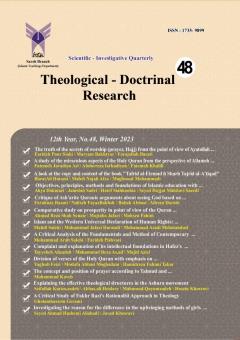-
-
List of Articles
-
Open Access Article
1 - The truth of the secrets of worship (prayer, Hajj) from the point of view of Ayatollah Abdullah Javadi Amoli and comparison with the view of Allama Mohammad Hossein Tabatabai
Farideh poursiahi Maryam Bakhtyar Farajollah Barati -
Open Access Article
2 - A study of the miraculous aspects of the Holy Quran from the perspective of Allameh Tabatabai and Orientalists
fatemeh javadiyan asl عبدالرضا فرهادیان Fatemeh Khalili -
Open Access Article
3 - A look at the copy and content of the book "Tafrid al-Etemad fi Sharh Tajrid al-A'tiqad"
baratali hatami Mahdi Najafi Afra Maghsoud Mohammadi -
Open Access Article
4 - Objectives, principles, methods and foundations of Islamic education with emphasis on the mystical thought of Imam Khomeini (RA)
Ahya Dakmaei jamshid Sadri hatef siahkoohian Seyed Hojjat Mahdavi Saeedi -
Open Access Article
5 - Critique of Ash'arite Quranic arguments about seeing God based on the views of Allama Helli and Allama Tabatabaie
farahnaz razmi Nafiseh FayazBakhsh Babak Abbasi علیرضا دارابی -
Open Access Article
6 - Comparative study on prosperity in point of view of the Quran and philosophy: a study on some concepts and approaches
ahmadreza shahsanei Mojtaba Jafari Eskavandi Mohsenn Fahim -
Open Access Article
7 - Islam and the Western Universal Declaration of Human Rights: Apostasy, Freedom of Thought
Mahdi Salehi Mohammad JafariHarandi Mohammad AsadiMehmandoost -
Open Access Article
8 - A Critical Analysis of the Fundamentals and Method of Contemporary Separatists in the Interpretation of the Qur'an
Mohammad عربصالحی Farideh Pishvaei -
Open Access Article
9 - Complaint and explanation of its intellectual foundations in Hafez's poetic thought system
Tayebeh Alizadeh mohamad reza asad majid azizi -
Open Access Article
10 - Division of verses of the Holy Quran with emphasis on belief Proposition
yaqoob feyzi mostafa abbasi moghaddam Hamidreza fahimitabar -
Open Access Article
11 - The concept and position of prayer according to Talmud and Javadi Amoli based on Tasnim
Mohammad کاوه -
Open Access Article
12 - Explaining the effective theological structures in the Ashura movement
seifollah karimzadeh Abbas,ali Heidary mahmud ghayumzadeh hossein khosravi -
Open Access Article
13 - A Critical Study of Fakhr Razi's Rationalist Approach in Theology
Gholamhussein Gerami -
Open Access Article
14 - Investigating the reason for the difference in the upbringing methods of girls and boys in the family by relying on verses and traditions
seyedahmad hashemialiabadi Javad Khosravi
-
The rights to this website are owned by the Raimag Press Management System.
Copyright © 2017-2026







